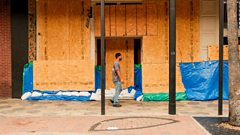Is Israel's society in a culture war or a political one?
Why are long-running protests taking place in Israel against the coalition government?
For three months, daily protests have been continuing in Israel over Prime Minister Benjamin Netanyahu's controversial judicial reform bill. Thousands of people have taken to the streets chanting “the country is on fire”.
However, Mr Netanyahu has now backed down, saying the move has been postponed to enable dialogue and avoid civil war in the country. The right wing coalition he leads has described the Israeli judiciary as "politically biased".
����ý Newsday spoke to Tomer Naor - the Chief Legal Officer of the bipartisan organisation, The Movement for Quality Government in Israel - to help explain the dispute between Mr Netanyahu and the Supreme Court judges.
"We don't really have a full separation between a parliament and a government. In that point the only authority that can protect human rights and fight corruption within the government is the judiciary... who can't really play the political game."
"You see changes within the Court, they are slower than in the political arena of course. Justices in the Supreme Court are here for a longer time usually than parliamentarians that come and go every few years. One of the problems is that the balance point with Israeli society is going more and more into the populist right, while our Supreme Court stayed... basically the Israeli society of 20 years ago... when we were supporting women's rights etc. And that clash is now between the Israeli [liberal views of 20 years ago] and the extreme right-wing."
(Pic: Protests in Jerusalem against Israel's judicial overhaul; Credit: Reuters)
Duration:
This clip is from
More clips from Newsday
-
![]()
Liam Payne: Fans mourn death of One Direction singer
Duration: 03:35
-
![]()
Sudan's footballers provide 'joy amongst the chaos'
Duration: 04:00
-
![]()
Hurricane Milton: The residents deciding to stay, or evacuate
Duration: 02:59






